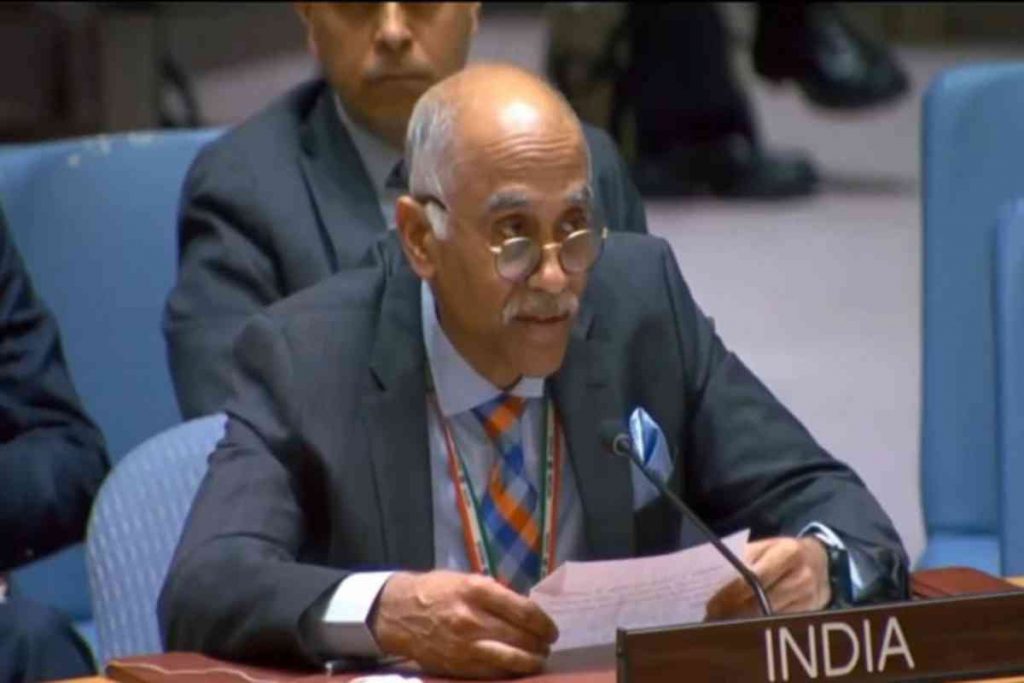India slammed Pakistan for raising the Kashmir issue at a United Nations Security Council debate calling it a “mischievous provocation” based on their “tested tactic of spreading misinformation.”
Exercising its right to reply during the UN Security Council Debate on Women building peace in a changing environment, India called out Islamabad over the “deplorable” condition of women from minority communities in Pakistan.
Addressing the UN Security Council debate, India’s Permanent Representative to the UN in New York, Parvathaneni Harish, said, “It is despicable, yet entirely predictable, that one delegation has chosen to indulge in mischievous provocation based on their pride and tested tactic of spreading misinformation and disinformation. It’s completely misplaced to indulge in such political propaganda at this important annual debate. We are well aware that the condition of women belonging to minority communities, notably Hindus, Sikhs, and Christians in that country remains deplorable,” he added.
His remarks came after Pakistan’s representative in his remarks during the UNSC debate made references to Jammu and Kashmir.
“An estimated thousand women of these minority communities, as per data of the Human Rights Commission of that particular country, are subject to abduction, forced religious conversions, and forced marriages every year. Anyway, I could go on, but I end here,” he added.
India thanked Switzerland for convening the crucial debate on women building peace in a changing environment and appreciated the insightful briefings by the Deputy Secretary General, the UN Women Executive Director, and civil society representatives.
“As we approach the 25th anniversary of Council Resolution 1325, India reaffirms its unwavering commitment to the Women, Peace and Security Agenda. We recognize that sustainable peace requires women’s full equal, meaningful and safe participation at all levels of decision-making, including politics, governance, institution building, rule of law, the security sector and economic recovery. Needless to say, the economic and social well-being of the population in general, and women in particular, are integral to sustainable peace,” Harish said.
The Indian envoy further recalled India’s deployment of the first-ever all-female formed police unit to Liberia in 2007. He stated that India has increased women’s participation in our peacekeeping contingents, with over 100 Indian women peacekeepers currently serving worldwide.
He also spoke about the honours received by Indian women peacekeepers serving in different parts of the world.
Highlighting the participation of Indian women in peacekeeping contingents, Harish said, “India has made significant strides in implementing the WPS agenda. As the fifth largest troop contributor, India deployed the first ever all-female formed police unit to Liberia in 2007, setting a precedent in UN peacekeeping. Their work garnered tremendous appreciation within Liberia and in the UN. We have increased women’s participation in our peacekeeping contingents, with more than 100 Indian women peacekeepers currently serving worldwide, including three all-women female engagement teams.”
“In 2023, Major Radhika Sen, who served in the Democratic Republic of Congo, was awarded the UN Military Gender Advocate of the Year Award. She follows in the footsteps of her illustrious predecessor, Major Suman Gawani, who was recognized for her service with the UN mission in South Sudan, she was honoured by the UN in 2019,” Harish added.
He recalled that India passed the Women’s Reservation Bill in 2023, which he stressed has empowered women in the political decision-making process.
Underscoring India’s efforts to enhance the participation of women in decision-making roles, P Harish said, “Domestically, India has been striving to enhance meaningful participation of women in decision-making roles. In 2023, India passed a historic Women’s Reservation Bill, reserving one-third of seats in national and state legislatures for women, empowering them in political decision-making process. We have promoted women’s leadership in community mobilization and public government interface, recognizing their role as agents of social change and cohesion.”
Speaking about the Self-Employed Women’s Association (SEWA) of Gujarat, he said, “The example of SEWA in Gujarat comes to mind. It’s a movement of self-employed women in rural and urban India. It’s also the largest trade union of the country. It has pioneered the empowerment of self-employed women, providing a voice to numerous women workers in the informal industry and promoting their leadership at all levels.”
India’s Permanent Representative also called for making use of new technologies to increase the participation of women while guarding against online threats and disinformation.
“In a rapidly changing world, we must harness new technologies to enhance women’s participation while guarding against online threats and disinformation. We have leveraged digital technologies to minimize the gender divide, enhance financial inclusion and empower women, especially in rural India. We call upon the international community to develop robust mechanisms to address these emerging challenges,” he said.
Harish expressed India’s commitment to further increase women’s representation in peacekeeping contingents, sharing best practices and supporting capacity-building initiatives for women peacebuilders. He reiterated India’s commitment to translating the WPS agenda from theory to practice and expressed readiness to collaborate with all stakeholders to build a more peaceful, inclusive and gender-equal world.
